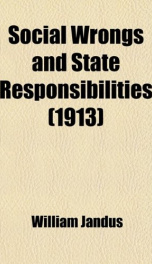social wrongs and state responsibilities

Purchase of this book includes free trial access to www.million-books.com where you can read more than a million books for free. This is an OCR edition with typos. Excerpt from book: VALUE AND THE ECONOMIC FORMULA The soul of economics is its formula, and the main concept in that formula is value. To apprehend the meaning of value is to apprehend the meaning of the economic problem. Paradoxical as it may appear "value" is an economic misfortune and "wealth" a disaster. It is only when a thing costs productive sacrifice that we appraise it as a "wealth." Hence wealth is a measure of nature's stint and man's poverty. In a paradise of costless abundance where things might be had for the taking, we should be rich in goods but poor in wealth. In an effortless Eden there could be no productive sacrifice and hence no "value," and to hoard up the eternally superfluous would be senseless. A ton of water will not exchange for a pennyweight of gold, though value for value, every drop of water is infinitely more useful than a pennyweight of gold. But gold is scarce, that is, difficult to produce, while of water there is a superabundance. Hence we place gold in the category of wealth while water does not appear on the list. Were water as scarce as coal, a man owning a lake of it would become a billionaire, but it would be a national disaster to list it as a wealth asset. What a thing is worth to us depends upon the units of productive sacrifice we are willing to expend to obtain it. Value is an appraisement of the sacrifices of production, or costs in terms of productive effort. Into these costs enter the wear and tear of our physical, mental, and psychic processes. We capitalize, as it were, these sacrifices, and call them value. Hence all value implies actual or potential units of labor- cost or units of productive sacrifice. If, for the present, we regard the average effort to earn a dollar, as a unit of human effort, and we start with a quantity of ir...
Info about the book
Author:
Series:
Unknown
ISBN:
0307700216
Rating:
4/5 (3)Your rating:
0/5
Languge:
English
Users who have this book
Users who want this book
What readers are saying
What do you think? Write your own comment on this book!
write a commentif you like social wrongs and state responsibilities try:
Other books by this author
Do you want to read a book that interests you? It’s EASY!
Create an account and send a request for reading to other users on the Webpage of the book!

